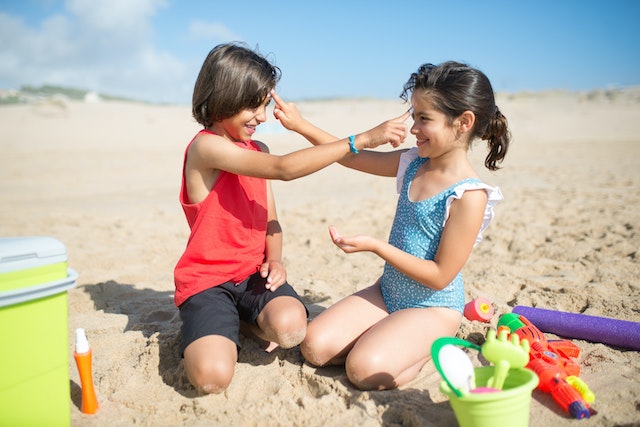The highlights:
· Your child should be wearing sunscreen because the sun can harm their delicate skin.
· Children are more prone to sunburn than adults and it’s our job as parents to ensure they don’t get burned
· They should use a physical barrier sunscreen of at least SPF30+
· Children have thinner skin than adults, and absorbs more chemicals than adult skin. This is why chemical sunscreens are less suitable
· Before the age of six months, no sunscreen is suitable. Your child should not be exposed to direct sunlight at all. Vitamin D drops should be prescribed.
What is Sunburn and How Do You Get It?
The sun harms skin through UV rays. UV light penetrates skin and damages skin cells. This causes the body to increase blood flow to the area, which makes the area hot – this is the burn part.
It’s important to remember it is not the heat of sunlight that damages; it’s light. You can even get sunburned in very cold snowy locations.
Sunburn is painful in the short term, which you want to avoid for your child. But in the long term, it causes skin damage which leads to premature ageing. It also can change the DNA of skin cells, which can mutate and form cancer. Skin cancer can be very difficult to treat.
A sun tan is caused by melanin. Once skin is exposed to sunlight, it increases the production of melanin to try and prevent further skin damage. So, once you see a tan on your child, they have had some skin damage.
What is Recommended Sunscreen Use for Children in India?
Sunscreen is not recommended for children under the age of six months old, simply because their skin is very sensitive. For babies under six months, it is advised that they don’t spend time in the sun, staying in the shade whenever possible. However, after six months of age, sunscreen is safe and encouraged for all children.
You should be applying sunscreen to your toddler or child if they are in the sun for any longer than about 20 minutes. You will need to reapply as per the manufacturer’s directions, typically every one to two hours.
What Sunscreen Should I Use for My Kid?
There are two types of sunscreens, a chemical barrier and a physical/ mineral one.
Chemical Sunscreens
Chemical barrier sun creams use chemicals that penetrate your skin and absorb the harmful UV rays. These chemicals are often:
· oxybenzone
· avobenzone
· octisalate
· octocrylene
· homosalate
· octinoxate
Chemical sunscreens are lighter, easier to apply, and don’t leave you with that white layer or that feeling of stickiness. However, adults and children are known to react to the chemicals in the sunscreen. Aminobenzoic acid (PABA) and trolamine salicylate have been banned by the FDA after concerns about their side effects.
If your child has a reaction to their sunscreen, discontinue use immediately. Use a barrier cream to protect their skin, such as Vaseline. You may want to see a doctor and be prescribed a hydrocortisone cream. If your child will continue to be in the sun, simply use the physical barrier sunscreen over the top of the barrier cream.
Oxybenzone and octinoxate are harmful to coral reefs. If you are going snorkelling or swimming in the sea, it is preferable to use a physical barrier cream.
Physical/ Mineral Sunscreens
These sunscreens work by creating a physical barrier on top of the skin that stops the sun rays reaching the skin. Typically, the ingredients list will have zinc oxide or titanium oxide. These sunscreens are recommended for children and those with sensitive skin. They are broad spectrum, and generally more effective than chemical sunscreens.
However, they typically are harder to apply, feel sticky, and can leave the skin looking white. They also may not be as resistant to water or sweat as physical sunscreens.
Which Sunscreen Should My Kid Use?
Whenever possible, use a physical barrier sunscreen. Apply it whenever you will be in the sun for more than 20 minutes. Reapply as per the manufacturer’s specifications.
The brand does not matter. However, there is no required and guaranteed testing in India for sunscreens. Always use reputable brands that lab test their products. Below are a list of Indian-produced sunscreens that use a physical barrier sunblock. Please note we have not had these tested, and cannot recommend any specifically.
· MamaEarth
· MotherSparsh SPF 30
· Tikitoro Kinds SPF30
· The Moms Co. Mineral Based Baby Sunscreen SPF 50+
What are SPF Ratings?
When you see ‘SPF 50’ or ‘SPF 30’ on the bottle, it is telling you how long the UV radiation will take to redden your skin compared to without. SPF30 will take 30 times longer to burn compared to no sunscreen. Generally, SPF30 protects you from about 96.7% of UVB rays, and SPF50 protects from about 98% of rays. Anything more than SPF50 does not really give any extra benefit.
What is Broad Spectrum Sunscreen?
Broad spectrum means that sunscreen protects against UVA and UVB rays. Your sunscreen should always protect against both.
Is Sunscreen Waterproof?
The term ‘waterproof’ no longer is applied to sunscreens. The FDA claimed that it gave a false impression to people that the sunscreen didn’t need to be reapplied. The term used now is ‘water resistant’ and it will tell you on the pack how long it lasts before it needs to be reapplied.
What are UVA and UVB Rays?
The skin emits two kinds of rays. The UVA rays are absorbed deep in the skin (called the ‘dermis’ layer) and dry it out, causing wrinkles and ageing. UVB rays are absorbed in the outer skin layer (epidermis) and cause sunburn.
Should My Baby be Sunbathed?
No. The American Academy of Pediatrics (AAP) says that it’s important to keep children younger than six months old out of the sun. While the Aunties and probably your mother-in-law claim it is good for the child, it is not. Unless prescribed by a doctor for jaundice, avoid all direct sunlight in babies. If your child has rickets, is exclusively breastfed, or your paediatrician is worried about vitamin D, they should prescribe vitamin D drops.
Are Sunscreens Safe?
They are safer than cancer. If you are worried, use a physical barrier cream rather than a chemical barrier. If you’re still concerned, cover up, avoid the sun between 10am and 4pm, and wear a sunhat outside.
Is Coconut Oil a Sunscreen?
In short, no. It has an SPF of 1, which is far below the minimum recommended SPF. While we love natural skin care (and for many people, coconut oil is great for their skin), it is not sunscreen. Use it under your sunscreen if you wish.
Do I Need Sunscreen on Cloudy Days?
Yes. The sun’s rays are still there, even in heavy cloud.
What’s the Difference Between Baby Sunscreen and Adult Sunscreen?
They have the same active ingredients, but the kid’s packaging has cute pictures on it and probably cost more. If the sunscreen is mineral ‘physical’ barrier based and is at least SPF30, you can use adult sunscreen fine. Adults can use baby sunscreen also.

